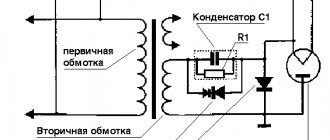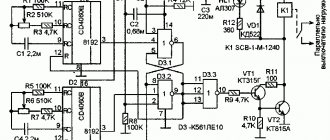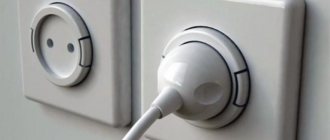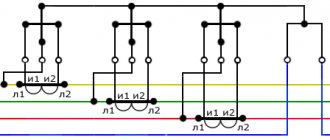When will power outages become illegal?
Restriction or suspension of electricity supplies is carried out on the basis of Art. 546 Civil Code, Art. 38 Federal Law “On Electric Power Industry” and Section XI of the Rules approved by the RF Government No. 354 of 05/06/2011.
The energy supply contract is public; according to Article 540 of the Civil Code, it is valid from the date of actual connection to the power grid.
The absence of a written agreement between the supplier and the subscriber in accordance with Article 540 of the Civil Code of the Russian Federation is not a reason for turning off the power.
If the subscriber has legally connected to the networks and pays for energy supply on time, then the contract has been concluded from the moment of connection.
IMPORTANT: According to Art. 310 of the Civil Code, unilateral changes in the terms of the contract, refusal to fulfill obligations are illegal. Exceptions to this rule are established by the above laws and government regulations. All other cases of turning off electricity, except those given in the listed documents, are illegal.
Most often, electricity is turned off if it is necessary to eliminate or prevent an accident. Planned shutdowns for the purpose of prevention are carried out according to a schedule communicated to consumers in advance; it is legal to carry them out no more than three times a year, no more than for a day each time.
Emergency operations are automatically performed by emergency control devices. Private unscheduled outages on this basis indicate the unsatisfactory performance of the energy supply organization, the incompetence of its management and (or) specialists assigned to the house (neighborhood).
We talked about how to find out why there is no power, whether it is an emergency shutdown or a planned one, in a separate article.
In SNT
Turning off the power is a common measure of the impact of SNT boards on gardeners.
It is often used to force garden house owners to comply with the requirements of the governing bodies of the partnership and to speed up the collection of membership fees.
Such actions of the chairmen of the SNT in accordance with 66-FZ of April 15, 1998 are illegal, they can be considered a crime under Art. 330 of the Criminal Code (“Arbitrariness”), as well as to recover moral damages from the chairman, even if he justifies them by a decision of the board or meeting of the partnership.
In the apartment
ATTENTION! Utility workers often turn off electricity for non-payment of other utility bills and services, the supply of which is illegal or technically impossible to limit, even when the subscriber has paid for the supply of electricity itself. It is illegal.
In such cases, utility services have the right to demand payment of debt through the magistrate's court, then through bailiffs. And they have no right to turn off electricity for this reason.
The rules prohibit turning off electricity before holidays and weekends.
Reasons for turning off the lights for non-payment of utilities
Unauthorized shutdown of electricity by the service provider is an illegal act. The legislation strictly defines cases and grounds for stopping the supply of light, which can be grouped as follows:
- The occurrence of cases beyond the control of the consumer. This may include:
- planned preventive measures carried out on networks;
- accident elimination;
- breaks in power supply lines due to natural disasters, emergencies, etc.
- Occurrence of cases depending on the consumer:
- refusal to pay for the consumed resource and the occurrence of debt;
- improper use of devices, which can lead to emergency situations;
- unauthorized connection;
- connecting electrical appliances exceeding the maximum permissible power;
- any violation of the contract.
Most often, a shutdown or suspension of electricity supply to an apartment or house occurs due to accumulated debt. At the same time, the service provider has the right to turn off the lights if there is a debt for consumed electricity, if the payment has not been paid for more than two months (clause 118 of PP No. 354) .
This norm is enshrined in legislation and cannot be changed by the contractor independently.
Can electricity be turned off for non-payment without a court order?
Yes they can! To turn off electricity, you do not need a court decision, but only need to notify the defaulter on time and follow the procedure for turning off the lights.
What responsibilities are provided by law?
Frequent illegal switching off of electricity is considered a crime under Art. 330 of the Criminal Code (“Arbitrariness”). Civil liability in the form of compensation for material and (or) moral damage is provided for in accordance with Article 15 of the Federal Law “On the Protection of Consumer Rights” (N 212-FZ of December 17, 1999, N 171-FZ of December 21, 2004). It is possible to achieve administrative liability of the supplier under Article 14.31 of the Code of Administrative Offenses, since it is a natural monopolist.
Who to call if the lights are turned off?
- Most cities have a hotline that you can call in case of interruptions in the supply of any utilities, including electricity.
You can easily find out her number at the help desk or at the reception desk of the local administration. - It is also necessary to write down in advance the number of the Emergency Dispatch Service of the Electric Network, the emergency dispatch service of the municipal district administration.
Many cities have a single dispatch service with a short, memorable number, for example, 005. - Information about planned outages is usually provided in advance on the website of the administration of the municipal district or city.
Why is the electricity cut off?
All consumers whose disconnection from power supply is not accompanied by catastrophic consequences, disruption of the technological cycle or causing harm to human life and health are classified in category III.
This is the entire residential sector of settlements. They can be disconnected from the power supply if there is a need for technical work on the power line. Not only during accidents, but also during the reconstruction of the power supply system and its maintenance.
For example, during the planned replacement of supports, transformers and other regulatory activities. The maximum shutdown time is not specified by law. In practice, it does not exceed 24 hours; multi-day outages do occur, but very rarely. Scheduled work is notified in advance, usually at least 2 days in advance.
Shutting off electricity for non-payment is the most common case. However, there are several other reasons why such measures are applied to consumers.
- Unauthorized connection to power lines and theft of electricity. A broken seal on the metering device can also lead to such conclusions.
- Intentional damage to electricity meters.
- Installing electrical appliances with too much power and exceeding the consumption limit established by energy supply organizations.
- Actions leading to deterioration in the quality of supplied electricity. This is a very interesting point. The fact is that the installation of capacitor banks to compensate for reactive energy in order to save money may be accompanied by emissions into the general network during those periods when the level of overall consumption decreases. They lead to distortion of the sinusoid shape and exceeding the maximum permissible voltage values. First of all, this applies to products made in China that are plugged into an outlet. However, even industrial models can only be installed in agreement with energy supply organizations.
What to do if the light goes out very often?
If the shutdown is the result of an accident, a repair team is dispatched to the site. It usually takes several hours to eliminate the causes of the accident. If such emergencies occur frequently, this is a reason for a complaint.
Typically, energy supply contracts provide for the norm of planned shutdowns of energy supplies no more than three times a year, no longer than a day in a row each.
If shutdown occurs more often, the following consumer actions are advisable:
- write a statement in duplicate about power outages to the energy company that services your home.
- The application is accepted by the secretary, who stamps and signs with the date of receipt on his and your copy of the incoming document.
- Go to the customer service department of the energy company, tell the employees about the problem verbally, and ask when it will be fixed. According to the rules, it must be eliminated within 24 hours. The exception is restoration work after destruction caused by a natural disaster or other force majeure.
- If after your request the outages continue, this is a reason to go to court.
Legal grounds for disconnection
The fulfillment of contractual obligations between the electricity supplier and the consumer is regulated by Decree of the Government of the Russian Federation No. 442 of May 4, 2012. The document approves the rules for stopping power supply, as well as legal grounds for turning off power, which can be divided into three groups.
Termination of the agreement
By default, an electricity supply contract is concluded for an indefinite period, unless otherwise specified. The reasons for its termination are as follows:
- Entering a restriction mode at the request of the consumer. For example, the owner does not want to pay for electricity in a room that no one uses. The user sends a request to the organization with which an agreement has been concluded for the supply of the resource. Within one day, it is transferred to the contractor, who will turn off the power supply.
- The expiration of the temporary power supply scheme or the appearance of a reason for early disconnection from the network. This scheme is used mainly on construction sites and is valid for 12 months.
- Termination of the agreement for the supply of resources by agreement of the parties. The restriction is introduced 3 business days after the service provider receives information about the termination of the contract.
Before terminating the contract, the consumer is obliged to pay for the supplied resource.
The need to carry out repair work or eliminate an accident
Power supply systems operate around the clock and require constant monitoring of their condition, as they are a high source of danger. Ensuring their normal operation and maintaining safety sometimes requires stopping the supply of resources; the need arises in the following cases:
- Discovery by a supplier's representative of an unsatisfactory technological condition of the user's electrical installations, which increases the risk of an accident or threatens people's lives. The decision to disconnect is made by a representative of Rostechnadzor. Before entering the restriction mode, the subscriber is notified in advance.
- Threat or emergency. The law does not regulate the time frame for eliminating the consequences. To minimize damage due to an accident, if the lack of electricity can cause serious and irreversible problems, an agreement on technological and emergency protection is drawn up with the energy supply company. The document defines the minimum load value that ensures normal operation of electrical equipment.
- Planned repairs. The terms and time of work are specified in the contract. Approved by the RF PP dated December 27, 2004 No. 861 “Rules for non-discriminatory access to services for the transmission of electrical energy and the provision of these services” in paragraph 31 (6) establish a limit on the permissible time for limiting power supply: up to 24 hours at a time and no more than 3 days at a time year.
Timely detection and repair of faults contribute to continuous power supply.
Violation of obligations by the consumer
Unscrupulous consumers may find themselves without power supply by not fulfilling the terms of the contract or by breaking the law. Reasons for disconnection are:
- The presence of a legal requirement of a bailiff to limit the supply of a resource. It is introduced immediately or on the day established in the court decision, of which the initiator is obliged to notify the consumer.
- Detection of the fact of unauthorized connection to the network (non-contractual consumption). Disabling is carried out immediately or, if additional measures are required, no later than 3 days from the moment the violation is detected.
- Unaccounted resource consumption (theft). Disconnection from the network is carried out as soon as information about a violation is received. No prior warning to the offender is required.
- Payment arrears for more than three months. The debt is calculated based on consumption standards, not meter readings. The restriction is introduced at the request of the resource provider with mandatory compliance with the legal order: notifying the subscriber of the applied sanctions 30 days in advance and drawing up an act on the day of deactivation. The document is drawn up in the presence of the debtor or two uninterested persons. Refusal to acknowledge a debt is not an obstacle to the application of sanctions.
IMPORTANT! If the consumer has eliminated the reasons for disconnection before the date specified in the notification, the restriction regime does not apply to him.
You can notify about the disconnection in any available way: inform in person (by SMS, in a payment receipt, by letter with notification), publish a message on the company’s website or in the media.
If it is established that a consumer has violated the power supply limitation regime, the authorized company disconnects it from the network immediately.
According to clause 20 of the Rules for complete and (or) partial limitation of power consumption, approved by the RF Government on May 4, 2012 No. 442, measures to limit and connect the power supply are carried out on a paid basis. If the disconnection is declared illegal, the contractor has no right to demand compensation.
How to record a violation?
First of all, you need to collect the signatures of your neighbors as witnesses to the shutdown, even if it only happened in your apartment (house).
Then you need to call representatives of the energy company that supplies you with services and achieve the creation of a special commission that will record the violation by drawing up an act.
The commission must include a representative of the energy supply organization and (or) management company.
A member of the SNT has the right to call the local police officer and register a complaint at the police station.
How to deal with frequent power outages online via the Internet?
- As a rule, the websites of municipal administrations are interactive, where you can write a statement outlining your problems and wait for a response.
- Register on the federal government services website and file a complaint in the appropriate window on this site. Registration rules are given on the website. They require a personal appearance at one of the local institutions for identification.
- If the previous appeal did not have any effect, you should contact the website of the regional prosecutor's office with a complaint in any form.
Finding out the address is easy: write in Yandex Search: website of the prosecutor's office of the N region (republic, territory, district). Your complaint will be considered if it does not violate the rules given on this site. If you have not previously contacted the authority to which the energy supply organization is subordinate, your application will be forwarded to this authority for action.
How to write a paper complaint?
In the header you indicate your full name, contact details of the registration address and actual and other contact details.
The application is written to the prosecutor of your city (district).
In the title you write: complaint about violation of the Rules for the provision of utility services.
Describe the situation in any form.
What documents should I attach to the complaint?
Attach to the application the text of the complaint with the collected signatures of the neighbors and (or) the Act of Violations with the signatures of the commission members (if any). Leave the originals for the court.
Sample complaint to the prosecutor's office about a power outage.
What are the paper feeding methods?
You send a paper application to the prosecutor's office in a simple letter, which you drop in the mailbox.
It is sent to other authorities by registered mail with notification or brought in person and handed over to the secretary of the institution against signature.
Institutions for receiving complaints
- Energy supply company.
- The higher-level organization of the energy company (founder).
- City (district) administration.
- City (district) prosecutor's office.
- World Court, your territorial area.
On our website you can find out how to draw up a notice and an act on turning off electricity for debts, what to do if the lights are turned off on this basis, as well as what fines are provided for unauthorized connection to the power grid.
The law is harsh
As of January 1, 2022, the moratorium on power outages and the accrual of penalties for late payments ceased to apply. Let us remember that the relaxations introduced a year earlier were related to the pandemic. This does not mean that all debts were forgiven in 2022, but defaulters did not risk being left without electricity.
Now the conditions return to the original ones, which means that:
- Penalties will be charged for late payment.
- If payments are delayed for a long time, electricity supply may be suspended or terminated.
- In order for the light to return, you will have to pay a certain amount, and this will not happen immediately, but only within two days.
The reply is in process
The energy supply must be restored by the supplier two days after the debt has been fully repaid and (or) other causes that led to the outage have been eliminated.
In practice, this procedure takes from three days to a week in different regions.
Where payment is made according to the average, and not according to meter data, it begins from the moment of presentation of documents on debt repayment, and not from the actual connection. It is useless to argue with the state on this issue.
The government agencies you contact are required to give you a written response within a month. When applying via the Internet, the response will be given electronically.
What other penalties are there for non-payment?
Shutting off electricity is one of the measures to combat non-payers for utility services. Other measures may also apply to them:
- Peni . For non-payment of any of the housing and communal services, the contractor has the right to charge penalties. It is accrued after 90 days, during which debts accumulated. This means that from the 91st day an amount of 1/130 of the refinancing rate established by the Central Bank of the Russian Federation will be accrued daily. You can check the calculation of charges in a convenient online calculator.
- Eviction . Applies only to those residents who occupy municipal housing space on the basis of a social tenancy agreement and have not paid utility bills for more than six months. At the same time, if at least part of the payments are made or there are valid reasons, eviction is not applied. This measure can only be used on the basis of a court decision.
The owners of the premises can only be evicted by a court decision.
In general, it is impossible to disconnect a consumer from electricity for non-payment of other utility bills. The debt is calculated for each specific service and the measure of restriction or disconnection is applicable only for it. This means that if there is a water debt, only the water can be turned off.
If the consumer currently has a difficult financial situation that does not allow him to pay for electricity in full, he must contact the management company or the resource supplier (depending on who the contract for the supply of energy is concluded with) for an installment payment plan. Typically, such installments are provided for a period of six months. This will avoid a power outage in the apartment.











